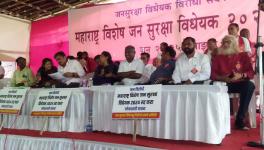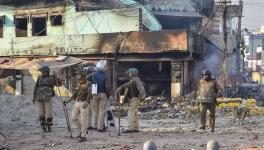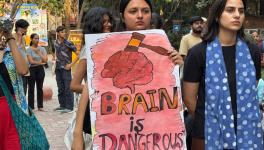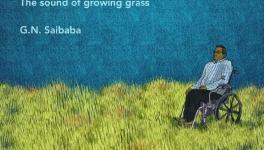‘Helping Others is Her Nature’: Brother of Jailed Activist Gulfisha Fatima, as Calls Rise to Free Her
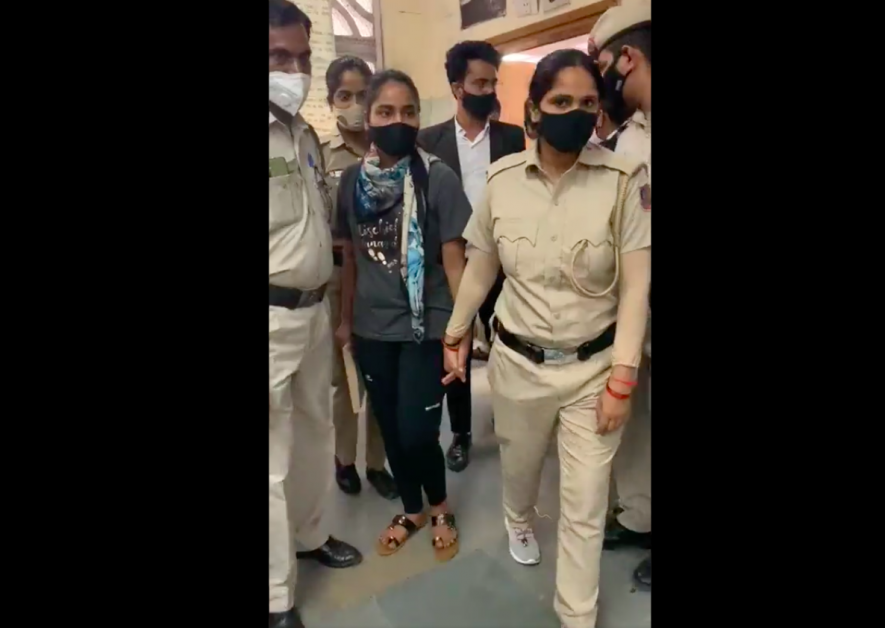
New Delhi: He is able to recite Urdu couplets flawlessly to strangers and comfort his wife who breaks down at the slightest mention of her daughter’s name. He even goes to work every day and smiles like his oldest daughter has not been incarcerated for the last 18 months.
But according to his own admission, 60-year-old Tanseef Hussain, father of political prisoner Gulfisha Fatima, is a withering man. “My depression has become worse. My sugar levels are also falling; before coming here, I had gone to visit my doctor and fainted in front of him,” Tanseef tells a room full of people, including activists and journalists, who have gathered to demand the release of Gulfisha at Delhi’s Press Club of India.
Gulfisha, known to her friends and family as Gul, was arrested by the Delhi Police on April 9, 2020 in connection with the Northeast Delhi riots case. To her friends, and a hundred others who participated in events across the country on October 9 to demand the 29-year-old’s release, Gul is a leader who became a “powerful voice of collective assertion and democratic resistance” against the CAA-NRC. However, to the Delhi Police, Tanseef’s daughter is allegedly a “terrorist” accused of conspiring and orchestrating the 2020 Delhi riots. She stands accused in four cases, charged under the infamous anti-terror law Unlawful Activites (Prevention) Act and sections such as murder and attempt to murder. She has secured bail in all other cases, but remains in jail under FIR 59/20, which invokes UAPA -- a highly controversial law.
This is not the fate Tanseef, who runs a shop in Jaffrabad, had foreseen for his daughter. She had finished her Master’s from Kirori Mal College under Delhi’s University a few years ago and was supposed to get a job after her MBA. A PhD could have been another possibility. Gul could study to her heart’s content, which was what her parents had agreed on. Notwithstanding Gulfisha’s background and ambitions, the Delhi Police, which reports to Home Minister Amit Shah, would come after her for participating in protests against the controversial and discriminatory Citizenship Amendment Act.
“She was applying for jobs even when she was participating in anti-CAA protests and preparing for the National Eligibility Test,” says 26-year-old Aqeel, Gul’s younger brother. However, according to the Delhi Police, Gulfisha wanted to spread violence and orchestrate riots that would shake the national capital. It is a different matter that in the affidavit where the Delhi Police make these accusations, they also state that the overwhelming loss of life and property was suffered by the Muslim community in the riots.
The barrage of cases against Gul keeps Tanseef awake at night. “I can’t sleep at night anymore. Every day, I wake up with a headache because of all the sleeplessness, and force myself to go to work as I need to take care of my young kids,” he tells the audience. Gul’s politics was not always responsible for giving her father sleepless nights. She had never participated or engaged in any other protest before the anti–NRC movement. But the anti-CAA protests had changed something in her. “Baaji didn’t have anything specific, individual aim in mind before joining the protests. She joined the protest because everyone around her was joining the protests”, says Aqeel. Gulfisha is also not affiliated with any student group or political party.
While the National Register of Citizens (NRC) is an exercise that would identify people living without documents in India, the CAA allows only non-Muslims from Bangladesh, Pakistan and Afghanistan, who are living without papers in India, to apply for Indian citizenship. The law has been strongly criticised for making religion a basis for granting citizenship.
It started with Gulfisha just following the crowd, but the anti-CAA-NRC protests made a leader out of her. Once a quiet child, Gulfisha had slowly become the master of fiery speeches, which would often include the teachings of Fatima Sheikh, Savitri Bai Phule, Babasaheb Ambedkar, Mahatma Gandhi and Bhagat Singh. Her speeches would leave scores of women and men gathered in Jaffrabad energised.
Gulfisha would ensure that whoever took the mic at the protest stage did not speak anything against constitutional ethos and values. But that is where her influence ended. She did not have the kind of weight enjoyed by Bharatiya Janata Party leader Kapil Mishra who can be heard here making an instigating, communal speech and issuing an ultimatum to the Delhi police — in the presence of a senior police officer — to clear the roads of protesters a few hours before violence spread in northeast Delhi. A fact-finding committee constituted by the Delhi Minorities Commission had observed that violence had erupted in parts of North East Delhi on February 23, 2020, soon after Mishra’s speech. Nor could Gul make crowds shout “Goli maaro saalon ko,” as Union Minister Anurag Thakur did before the Delhi Assembly elections.
Despite her limited hold, Gul managed to become a thorn in the eyes of those who believed in communal polarisation. Once, some miscreants locked her inside her house to stop her from going to the Jaffrabad protest site, which was a symbol of India’s unity and secularism for thousands of locals. “We had to break the lock of our own house with a hammer to get her out. Many women had gathered outside to ensure that Gul was free,” her father recounts the incident. But he does not know what will it take to free her this time. “At some point, she will get bail. Once my girl comes back to me, maybe I could live a little longer,” Tanseef hopes. His son also believes that it is only after Gulfisha’s release that his father will get better. “My father is undergoing treatment for depression, but the real problem is the imprisonment of my sister. Once she is out, my father’s health will also improve,” says Aqeel.
Life behind prison has, however, not seemed to change Gulfisha as a person. She would teach women from her neighbourhood to read and write at the protest sites, a legacy she continues behind bars in Jail Number 6 at the Tihar Jail complex. She taught children of inmates at the prison creche when it was briefly open, and currently, she is giving art lessons to her fellow inmates. “Helping others is who she is. She is only doing inside jail what she was doing outside it,” her brother says proudly.
Aqeel and Tanseef are both hopeful that Gulfisha will be out soon. As much as they miss her, they are not scared for her. “A father whose child has stolen something is scared, but a father whose child goes on to fight at the border is not scared,” Tanseef answers when asked what he thinks of his daughter’s actions. He summarises his feelings with a couplet from Mirza Azeem Beg -- “Girtey hain shahsawar hee maidan-e-jung mein, woh tifl lya girega jo ghutnon kay bal chaley”.
Get the latest reports & analysis with people's perspective on Protests, movements & deep analytical videos, discussions of the current affairs in your Telegram app. Subscribe to NewsClick's Telegram channel & get Real-Time updates on stories, as they get published on our website.












